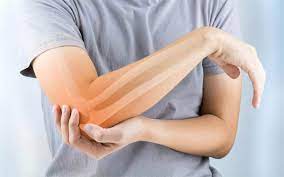Meet Specialist Orthopaedic and Joint Replacement Surgeon

Dr. Utsav Agrawal
Chief Knee and Hip Replacement, Complex Trauma Surgeon
Director Varunam SuperSpeciality Hospital, Nagpur
- M.B.B.S.
- M.S. Orthopaedics
- Fellow in Knee and Hip Replacement, Mumbai
- Fellow In Knee and Hip Surgery, Germany
- Fellow in Knee and Hip Surgery, NHS, Singapore
- Fellowship in Complex and revesion knee and Hip replacement, London, Lancaster, UK
Experience : 15 years / 15000+ Successfully Surgery completed
Joint Pain Treatment In Nagpur
Joint Pain
Joints are important parts of the body that help limbs move. If a person experiences pain in the joints, known as arthralgia, it can be uncomfortable and affect their ability to partake in daily activities.
Fibrous joints are usually immovable. They include the cranium in the skull, the joints between the teeth and the sockets in the jaw, and the joints between the bones of the lower leg.
Joint pain may affect the function of the joint and can limit a person’s ability to do basic tasks. Severe joint pain can affect the quality of life. Treatment should focus not only on pain but also on the affected activities and functions.


Symptoms of Knee Joint Problems:
- Pain: Persistent or intermittent pain in one or more joints.
- Swelling: Visible or palpable swelling or inflammation around the affected joint.
- Stiffness: Difficulty or discomfort in moving the joint, especially after periods of inactivity.
- Redness and warmth: Increased redness or warmth in the joint area, indicating inflammation.
- Limited range of motion: Reduced ability to fully extend, flex, or rotate the joint.
- Weakness: Feeling of weakness or instability in the joint.
Causes of joint pain
- Arthritis: The most common cause of joint pain, including osteoarthritis, rheumatoid arthritis, gout, and other forms of inflammatory arthritis.
- Injuries: Joint pain can result from acute injuries, such as sprains, strains, fractures, or dislocations.
- Infections: Joint pain can occur as a result of infections, such as septic arthritis, which is caused by a bacterial or fungal infection in the joint.
Joint Pain Treatment
- Physical therapy: Targeted exercises to strengthen the muscles around the joint, improve flexibility, and reduce pain.
- Injections: Corticosteroid injections or hyaluronic acid injections to provide pain relief and reduce inflammation.
- Assistive devices: Using braces, splints, or other supportive devices to alleviate stress on the affected joint.
- Surgical intervention: In some cases, surgery may be required, such as joint repair, joint replacement, or arthroscopy.
- Home treatments, such as applying a heating pad or ice on the affected area, may be recommended for short periods, several times a day.
- Exercise can help get back strength and function. Walking, swimming, or other low-impact aerobic exercise is best.
- Weight loss may also be suggested, if needed, to lessen strain on joints.
- Dietary supplements, like glucosamine, may help relieve pain. Ask the doctor before taking any over-the-counter supplements.
- Antidepressants may be prescribed to help improve sleep for a patient suffering from joint pain.
- Steroids, often given by injection into the joint, provide short-term relief of pain and swelling.
- Painkilling drugs that help ease pain.
Prevention and Recovery:
- Maintaining a healthy weight to reduce stress on the joints.
- Engaging in regular exercise to strengthen the muscles supporting the joints and improve joint flexibility.
- Practicing good posture and body mechanics to minimize joint strain.
- Using proper techniques and protective gear during physical activities.
- Taking breaks and avoiding overuse or excessive strain on the joints.
Recovery from joint pain depends on the underlying cause, severity, and chosen treatment approach. It may involve a combination of rest, physical therapy, pain management, and following the prescribed treatment plan. Rehabilitation exercises are typically used to improve joint function, strength, and range of motion.
